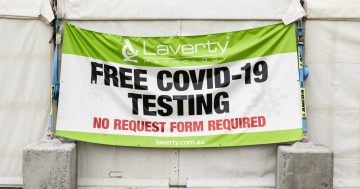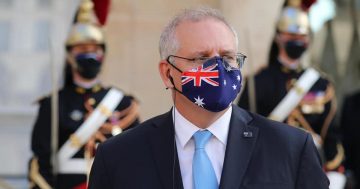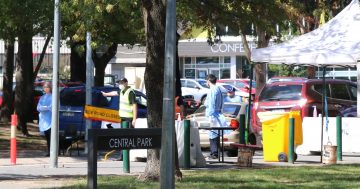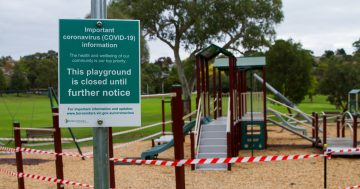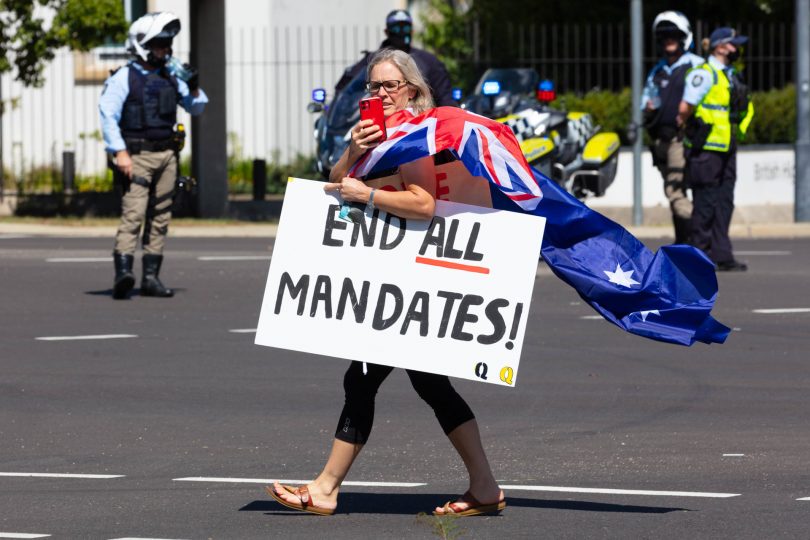
A protester during the Freedom Convoy To Canberra protest march earlier this year. Photo: Thomas Lucraft.
Rishi Sunak, the man who covets the number one gig in the United Kingdom, claims his government gave too much power to scientists during COVID-19 lockdowns and is now paying the price.
Sunak was the chancellor during UK’s darkest COVID-19 days, and now regrets being part of a campaign that scared people. His opponent in the race for Prime Minister, Liz Truss, also believes the government of which she is part went too far with lockdowns, especially in keeping schools closed.
In Australia NSW Premier Dominic Perrottet, easily the loudest voice among Australian leaders calling for a return to normality, is now leading the charge to reduce the COVID-19 isolation period. He believes the time has come when if you are sick, you stay at home, but if you’re not sick – it’s off to work you go.
In the ACT not a week goes by in which kids are forced to home school, because we don’t have enough teachers to cover staff who have to stay home under existing COVID-19 rules. The fact our kids’ education is still being disrupted should be reason enough to question if the current approach is the right approach.
Next year the UK will conduct a public inquiry into the government’s handling of the pandemic. It’s expected Australia will have a royal commission of its own, putting the microscope on how the state, territory and federal governments dealt with the pandemic.
There’s surely little question we need to have a good, long hard look at how we dealt with this once-in-a-lifetime global crisis. But the toughest early question will be, how broad will the terms of reference be?
Were the measures put in place to try to stop the spread of COVID-19 appropriate? Did they go far enough, or did they go too far?
Was the ‘Fortress Australia’ approach the right one? Was enough consideration given to the price Australia would pay in the longer term? Was the furlough scheme rigorous enough, what safeguards were put in place to discourage and prevent abuse?
Was it right to keep schools closed as long as we did? Did we provide the type of support our health services needed to deal with a disaster that quickly spiralled to a level none of us had ever experienced before?
The ACT Legislative Assembly had two select committee inquiries examining the Barr Government’s response to COVID-19. The first was established in April 2020, and delivered four interim reports before its final paper was delivered in October of the same year. It made more than 100 recommendations.
A second inquiry, this time examining the response in 2021, ran from September to November last year. It made 33 recommendations.
A lot of water has flowed under the bridge even since then. The changing nature of COVID-19 required flexibility. A lot of things, I am sure, the Barr Government got right. I am also sure they will be the first to admit that, if they had their time again, there are some things they would do differently, or not at all.
At the height of the pandemic there was a COVID-19 Small Business Hardship Scheme, Commercial Tenancy Support Scheme, Accommodation and Tourism Venue Operator Support Scheme, and Small Tourism Operator Covid Recovery Payment – just to name a few.
Imagine for one moment the bureaucratic nightmare that comes with administering all these projects, by a workforce mostly working remotely and I’m sure overwhelmed by people at all levels needing support.
In its response to the most recent Legislative Assembly select committee report, the ACT Government committed to undertaking a full review of the rollout of the Business Support Grant and Small Business Hardship Scheme.
It’s just one aspect of the COVID-19 response that needs to be reviewed. If Anthony Albanese is going to put a royal commission in place, let’s hope it’s thorough.












